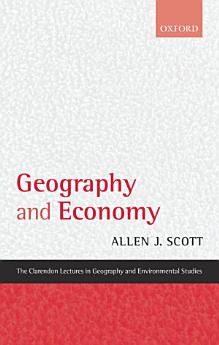Geography and Economy: Three Lectures
ફેબ્રુ 2006 · OUP Oxford
ઇ-પુસ્તક
192
પેજ
family_home
પાત્ર
info
reportરેટિંગ અને રિવ્યૂ ચકાસેલા નથી વધુ જાણો
આ ઇ-પુસ્તક વિશે
This book focuses on the theme of the mutually constitutive relations between geographic space and the economic order. Three principle lines of investigation are identified and explored. First, Allen J. Scott sketches out the general theory of the division of labour and the ways in which it is reflected in geographic patterns of specialization and interaction. He examines, in particular, the role of the division of labour in the formation of large-scale agglomerations of economic activity and the ways in which their internal and external relationships are played out. Second, he considers the structure of geographic space as a fountainhead of creativity, learning, and innovation. A theory of the creative field is presented, and its application to the investigation of entrepreneurship, technological change, and the dynamics of the cultural economy is considered. Third, he offers an account of the regional question in less developed parts of the world. Here, he recovers some of the arguments of high development theory and shows how they can be revitalized in the light of a specifically geographic approach. These three lines of investigation are, of course, tightly intertwined with one another. The argument in general demonstrates that geographic space is not just an inert dimension in which the economy unfolds, but plays an active role in the eventuation of economic outcomes. This state of affairs raises many difficult policy questions about growth and development in both more and less economically advanced countries. Some of the more important of these questions are also broached in the book.
લેખક વિશે
Allen J. Scott is Distinguished Professor of Public Policy and Geography at the University of California at Los Angeles. He has been a professeur associé at the University of Paris VIII (1974-75), a Croucher Fellow at the University of Hong Kong (1984), a Guggenheim Fellow (1986-87), a Visiting Exchange Scholar under the auspices of the NAS Committee on Scholarly Communication with the People's Republic of China (1986), and a Borchard Foundation Scholar (1997). He has occupied the André Siegfried Chair at the Institut d'Etudes Politiques, Paris (1999), the First Trust Bank Chair of Innovation at Queen's University, Belfast (2004), and the Chaire d'Excellence Pierre de Fermat at the University of Toulouse-Le Mirail (2005). He was granted honours by the Association of American Geographers in 1987, and was elected fellow of the British Academy in 1999. In 2003 he won the Vautrin Lud Prize.
આ ઇ-પુસ્તકને રેટિંગ આપો
તમે શું વિચારો છો અમને જણાવો.
માહિતી વાંચવી
સ્માર્ટફોન અને ટૅબ્લેટ
Android અને iPad/iPhone માટે Google Play Books ઍપ ઇન્સ્ટૉલ કરો. તે તમારા એકાઉન્ટ સાથે ઑટોમૅટિક રીતે સિંક થાય છે અને તમને જ્યાં પણ હો ત્યાં તમને ઑનલાઇન અથવા ઑફલાઇન વાંચવાની મંજૂરી આપે છે.
લૅપટૉપ અને કમ્પ્યુટર
Google Play પર ખરીદેલ ઑડિઓબુકને તમે તમારા કમ્પ્યુટરના વેબ બ્રાઉઝરનો ઉપયોગ કરીને સાંભળી શકો છો.
eReaders અને અન્ય ડિવાઇસ
Kobo ઇ-રીડર જેવા ઇ-ઇંક ડિવાઇસ પર વાંચવા માટે, તમારે ફાઇલને ડાઉનલોડ કરીને તમારા ડિવાઇસ પર ટ્રાન્સફર કરવાની જરૂર પડશે. સપોર્ટેડ ઇ-રીડર પર ફાઇલો ટ્રાન્સ્ફર કરવા માટે સહાયતા કેન્દ્રની વિગતવાર સૂચનાઓ અનુસરો.






